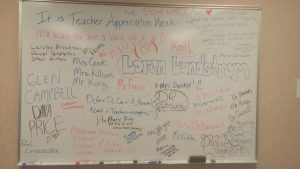Almost everyone who knows me knows how much I love commencement ceremonies. One of the perks of this job is that I get to attend so many of them.
It was my great fortune to preside over my very first graduation ceremony in late April: the High School Equivalency graduation. This is always one of my favorites to attend. The crowd is large, filling the Gillioz practically to its capacity. And boy, are they a raucous group. The emotions are celebratory, real and raw. They hoot, they holler, they make noises that defy duplication or explanation. Pure joy and pride. Families and friends gather for only one reason, and that is to hear their loved one’s name read and witness them grab hold of a diploma they weren’t sure would ever be attained.
As I stood on the stage watching graduates retrieve their diplomas and shake hands with Dr. Higdon, I was able to see their faces. Of all the commencement ceremonies I’ve attended, this was the first time I was ever that close. From stage left, a woman emerged when her name was read. I noticed that, give or take, she was about my age. As she approached with her hand outstretched to take her diploma, I noticed her broad smile.
And then, I saw the tears in her eyes.
In that moment, I wondered about her life. What was her story? What hardships had she battled? What struggles had she overcome to make it to this moment? This moment. What did it mean to her?
Every year around Commencement, I like to re-read this blog in the New York Times from a few years ago. The blogger, Kristin O’Keefe, writes: “Here’s the thing about a community college commencement: It’s not just joy-filled, it’s triumphant. Because for many of the people proudly waving their diplomas, this day was far from a certainty.”
Far from a certainty, all right. The more I work with students, the more I appreciate that when students achieve– and when they fail– it often happens for many small reasons. Teaching concepts and theories and skills is important, but of equal importance is how we acknowledge our students’ self-doubt and their complicated lives. The responses to this recent whiteboard prompt outside the Academic Affairs suite recognizes excellent teachers– no doubt about that– but I have a hunch these names, more importantly, are the names of people who helped students discover a passion, gain confidence in their abilities, feel their own value. Take a look:
(Even Professor Cheesecake got a shout-out.)
At a recent luncheon honoring A+ students, I shared with them one of my favorite quotes: “Many small people, who in many small places, do many small things, can alter the face of the world.”
Sometimes small things are the biggest things. Little messages of encouragement and support can offset considerable and very real struggles. I am proud that we serve our students with dignity and respect. We are small people. And we are in a small place, doing small things–but never underestimate the significance of them.
So on Thursday night at commencement, our graduates will come together–all 600-plus of them. They will appear before you as one large sea of black gowns and mortar boards– one blending with the other, without much definition. This is their moment, to be sure. But it is also yours. This moment could not have happened for them if it weren’t for your efforts. To some of them, you made all the difference. I encourage you to take a moment and look at their faces. When you do, you will see pride. You will see joy. You will see hope.
And in those faces, you will see worlds that have been altered, the result of your small things.

